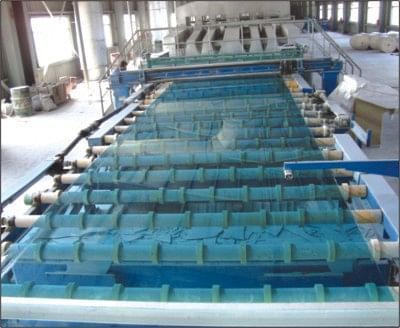Local demand for fancy glass curbs exports

A recent building boom has forced modern window-glass manufacturers to cut exports, market players said.
A surge in construction, which was almost stalled during the army-backed caretaker government in 2007-08, is behind the local demand for “float glass.” (The term refers to sheets of glass made by floating molten glass on a bed of molten metal, typically tin.)
“We have reduced our export by nearly 1,000 tonnes per month due to meet the growing demand in the domestic market,” said Nasiruddin Biswas, chairman of Nasir Group, which owns Nasir Glass Industries, a local pioneer in float glass.
Nasir Glass now exports 1,500 tonnes a month, off 1,000 tonnes from earlier levels. On the other hand local market consumption increased nearly 1,000 tonnes a month to 3,500 tonnes.
“Construction works have got its momentum after a gap of nearly three years,” said Biswas.
The other premier float glass-manufacturer, PHP, also saw a jump in domestic demand. PHP produces 3,500 to 4,000 tonnes of float glass a month.
“Now 100 percent of our production is being sold,” said Mizanur Rahman, head of marketing of PHP Float Glass Industries. “But it was maximum 70 percent a few months ago.”
Rahman attributed the good sales on construction, increases in wood prices and consumer appreciation of natural daytime light through the panes.
The use of float glass in buildings is relatively new in Bangladesh. Before Nasir and PHP entered into the market -- in 2005 and 2006, respectively -- it was imported in small quantities.
The glass market is now nearly Tk 1,000 crore, up from Tk 600 crore a couple of years ago. Two established glass-sheet factories -- Usmania Glass and MEB Glass -- made a cheaper glass used in more affordable structures, according to market players.
Silica and gas, the primary needs of makers of float glass, are available in Bangladesh. Secondary raw materials (dolomite, feldspar and limestone) are imported from neighbouring Bhutan, Nepal and India.
Biswas of Nasir Group said float glass is non-combustible, easy to clean, prevents harmful ultraviolet-ray penetration, reduces the solar heat entering into the building and is cheaper than wooden panel: “Yet, it is aesthetically much more elegant,” he said.
[email protected]

 For all latest news, follow The Daily Star's Google News channel.
For all latest news, follow The Daily Star's Google News channel. 



Comments